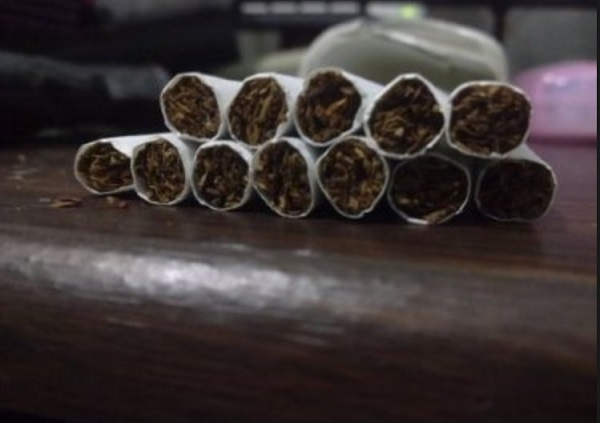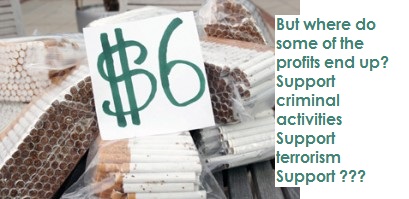SOLVING ILLICIT TOBACCCO A National Strategy There is no debate that the global trade in contraband tobacco has far-reaching implications for society. Too much evidence exists today to deny that the black market in tobacco draws in the involvement of a host of problems for public safety and national security. Complicating the picture is the inevitable Canadian debate relative to which level of government has control over what activities and in so doing responsibility for quelling the illicit tobacco industry falls between the cracks.
The reality of the debate is much more visceral when viewed through the lenses of aboriginal rights and commercial responsibilities. Competing “constituencies” in the debate continue to pursue support by staking out scientific, social and moral positions on the smuggling and selling of untaxed and unregulated tobacco products. The Ontario Convenience Store Association points fingers at the Canadian First Nations as the source of contraband tobacco off reserve. Law Enforcement warns of the role of Organized Crime – up to 175 gangs and the Italian Mafioso too! Band leaders on reserve say that it is their right to deal in tobacco all they want so long as it helps the economic prosperity of the community. Ontario farmers blame the McGuinty Liberal Government for “ripping them off” for 69 cents for the tobacco pounds they agreed not to grow pursuant to the Tobacco Transition Program of 2008. All in all, things are a mess!
The provisions of Bill C10, An Act to amend the Criminal Code (trafficking in contraband tobacco), which was sent to the Senate for “sober second thought” has passed Third Reading and awaits proclamation. The Bill will pass but it will leave a sour taste in the mouths of some of the Bill’s “constituencies”, including First Nations. During the Senate “consultation” process, several First Nations leaders decried the flawed consultation process with Canada’s First Nations.
Despite the progress against contraband tobacco with Bill C-10 from a law enforcement point of view, many of the conditions that support the illicit trade in tobacco remain. Save for high profile busts like the “Sweet Dreams” takedown last spring in Montreal that netted the Sicilian Mafia connection, the slow burn of the illicit tobacco trade has caused convenience store closures, stripped billions of dollars from federal and provincial tax coffers, made criminals out of law abiding farmers, and has opened new routes to marketing cigarettes to children on school grounds.
A National Approach
The solution to the many problems associated with contraband tobacco require more than just tinkering with federal legislation yet again. The complexities of the issue require a complete re-thinking of the problem of illicit tobacco and how best to deal with it.
A truly novel and potentially much more effective way of dealing with all tobacco regulation in Canada would be to appoint a National Tobacco Ombudsman (NTO) with sufficient investigative and search and seizure powers to greatly reduce or even eliminate the prevalence of illicit tobacco in Canada. To avoid any constitutional confusion, the NTO would be specifically national in scope but multi-jurisdictional in its powers and therefore a uniquely derived capability that can cross federal/provincial/First Nations lines to arrive at practical solutions.
Tobacco and Competing Constituencies
When it comes to a serious attempt to address the problems associated with the illicit tobacco trade in Canada, the solution needs to focus on four areas that need fixing. All four need to be dealt with rationally and objectively and potentially all by a properly selected and resourced NTO.
- Law Enforcement
To date in Canada the RCMP has been afforded the mandate and financial resources to combat contraband tobacco. Unfortunately, the Mounties have been sorely inadequate to the task. Despite RCMP press releases that take credit for illicit tobacco busts, two realities remain. First, most of the Mounties believe that stopping the flow of contraband tobacco is an insult to their mandate as Canada’s federal police force. Instead of trying to convince the RCMP that this is important work for them to pursue, it would be better to shift law enforcement to local and provincial police forces and provide them with the manpower and financial resources they need to investigate and pursue offenders.
Besides pursuing organized crime groups and chasing terrorism-related financial networks, there are many other, less sexy law enforcement activities that need to be attended to in order to fully address the contraband problem. For one example, enforcing the regulations that control the production and distribution of tobacco are provincial matters but require the monitoring and investigative expertise that comes with experienced and trained law enforcement personnel.
A NTO should be given the mandate to define the roles and resources of local and provincial police forces to support the enforcement of tobacco growing and distribution legislation and regulations at both the provincial and federal levels. Moreover, should the provisions of Bill C-10 (or something like it) come into effect, sworn peace officers from local and provincial forces will need to be coordinated in training and procedure.
- First Nations – Rights and Fairness
A First Nations Chief stated that Bill C-10 effectively allows the Canadian Government to enter the 6 Nations of the Grand River or Tyendinaga, both in Ontario, with no-knock raids, flash bangs, police dogs and RCMP in riot gear if we have in our possession unstamped tobacco products. In both the Akwesasne and Kahnawake reserves in Quebec there are no less than 50 illicit cigarette factories. First Nations here have long served notice to both legislative authorities and law enforcement that they are most unwelcome. Both of these reserves continue to produce high volumes of contraband tobacco that continue to be distributed across Canada.
- Growers – the 69 cent solution
Farmers in Southern Ontario believe fervently that they have been “screwed” by the Ontario Government. This screwing took place when Premiere McGuinty reneged on a deal, as part of the Federal Government’s Tobacco Transition Program of 2008, to pay farmers sixty-nine cents for every pound of tobacco they would not grow in future. Some of the farmers lost their farms; others found ways to circumvent the deal – take the money from the feds and continue to grow tobacco for sale to the black market.
The NTO would not permit this fiasco to develop. Fairness would have dictated a process for negotiating the buyout such that all parties would be agreeable to the outcome and all parties would respect the terms of activity or payment. To give the deal teeth, the NTO would have the resources to monitor the results of the agreement, including payments promised and behaviour modified.
- Taxation Rationalization
It is widely known that the infamous U.S. mobster, Al Capone, was convicted for tax evasion in order to put him away for life. Present day mobsters are involved in using contraband proceeds to engage in other serious criminal activities such as drug, gun and human trafficking and terrorism funding.
Studies by reputable think tanks such as the US Mackinac Institute have determined that there is a sweet spot in government taxation levels that represents the most effective price deterrent to smoking and the point where tax hikes drive consumers – especially young consumers – to buy contraband cigarettes.
A NTO would have the ability to provide much wisdom and hopefully much influence in advising governments at all levels how to set tax policy and rates within the context of knowledgeable consequences. The other important aspect that would be performed by the NTO is to ensure harmonization across jurisdictions which would eliminate “spatial arbitrage” between jurisdictional lines.
Action Required
The concept of a National Tobacco Ombudsman requires immediate discussion and very near term implementation so that tax bases can be restored with money now flowing to the criminal elements in Canada and abroad.
Ombudsmen are about protecting the rights of the public. A NTO with criminal investigative powers led by a credible Ombudsman would protect the legitimate interests of the First Nations communities, provide law enforcement with the tools to rid our communities of organized crime groups, provide guidelines for the orderly growing of tobacco on or off reserves, and stop the lust for tax grabs at the expense of public safety. This Ombudsman would be answerable to Parliament and would not be buried in the bureaucracy with hierarchical structures that have been established to protect and avoid issues of significant importance. Contraband tobacco in Canada continues to be a multi-billion dollar rip off that fuels organized crime and is a significant threat to national security as the illicit trade moves with fluidity across national and international borders.
The establishment of the NTO requires unwavering leadership, transparency and accountability at all levels of government, within commercial activity involving tobacco, and within First Nations’ communities. For the Silo, Edward R. Myers
Supplemental– Tobacco.org home to tobacco news and information




Leave a Reply
You must be logged in to post a comment.